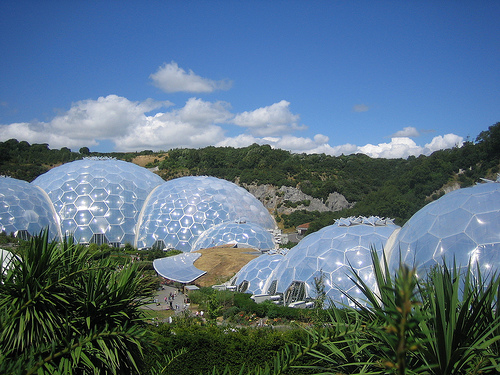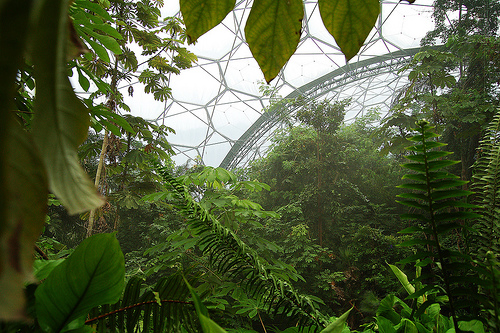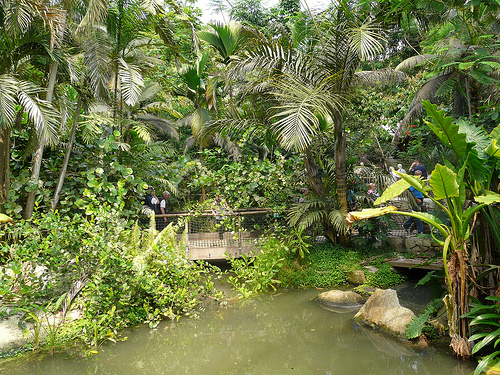

Location: Bodelva, St. Austell Map
Tel. 01726 811911
Open: Apr- Oct: 10am- 6pm daily
Nov- Mar: 10am- 4:30pm daily
Closed: 24, 25 Dec
Eden Project is a collection of artificial biomes situated 5 km (3 mi) from St Austell in Cornwall County in United Kingdom. It took two and a half years to constructed this impressive structures and populate them with various plants gathered from around the World. It was opened on March 17, 2001. The complex is composed of three distinct biomes. The first is the Outdoor Biome that is not covered and represents temperate region of native English plants. Covered biomes include the Tropical Biome that covers an area of 3.9 acres (1.54 hectares) with a highest dome reaching 135 metres (443 feet) and the Mediterranean Biome with an area of 1.6 acres (0.654 hectares) and a highest dome reaching 135 metres (443 feet). At night they are illumined in different colours.
The five geodesic structure domes harbor an exceptional set of plant species organized along a landscaped course. The project, funded by a non-profit foundation, emphasizes the conservation of resources and the contribution of plant diversity to human life. The educational contribution of the project allowed the foundation to obtain the GiftAid label that allows the organization to recover the taxes of the British State. These taxes represent around 30% of the amount of subsidies. All the technologies related to the cultivation of the plants that are carried out and developed in the Eden Project are done in collaboration with different research centers.
The Eden Project originated from an idea of the
English archaeologist and entrepreneur Tim Smit in a disused kaolin pit
near St Austell. It took six years from the idea in 1995 to the opening
of the facility on March 17, 2001. The garden is dominated by two huge
greenhouses, each consisting of four intersecting geodesic domes
designed by Richard Buckminster Fuller. Different vegetation zones are
simulated here. The Eden Project greenhouses are currently the largest
in the world.
A tropical-humid climate zone is simulated in the
larger greenhouse and a subtropical-dry and Mediterranean climate zone
in the smaller one. It aims to mimic a natural environment that houses
plants and also some animal species from around the world. The kaolin
pit itself has also been landscaped, planted and sculpted. However, the
garden is still under construction, and extensions within the site are
planned.
According to the operators, the outdoor area and the
greenhouses house 100,000 plants from around 5,000 species, above all
crops of all kinds. Particular value is placed on the presentation and
breeding of rare and old varieties threatened with extinction in order
to show the species and thus genetic diversity of crops to obtain.
The project takes a conservation and educational approach. In
addition to the names of the plants, visitors are also explained their
medicinal uses and their importance for our environment in order to
prevent them from destroying the environment through education. Regular
art exhibitions and information events related to nature and the
environment are also part of the park's program.
The designs for the geodesic domes came from the British architects Nicholas Grimshaw, the structural design by Anthony Hunt, and they were carried out by the Würzburg company Mero. The domes, which are intersected several times, are covered with 625 double-walled cushions made of ETFE, a particularly light, transparent plastic. The cushions were designed by the Bremen company Vector Foiltec. The foil cushions were fitted into a construction made of standardized, hexagonal and pentagonal tubular steel frame elements (space framework). The space frame constructions cover a total area of 23,000 m² (surface around 30,000 m²) without supports and are up to 50 m high with a diameter of up to 125 m.
The geodesic domes served as a backdrop for the James
Bond film 007 - Die Another Day.
Since 2002, the Eden Project has
hosted an annual music festival called The Eden Sessions.
In addition to "Eden Westwood" on the M5 in Devon, an Eden project was also planned in Morecambe in Lancashire, but funding was not secured for 2022. Another facility is planned in Tsingtau, China, in a collaboration between Eden Project International and China Jinmao Holdings, with construction beginning in 2020. The facility will feature the world's largest indoor waterfall.

